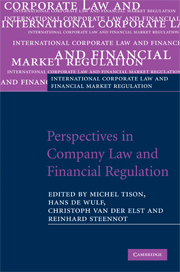Book contents
- Frontmatter
- Contents
- List of contributors
- Foreword
- PART I Perspectives in company law, SECTION 1: European company law: regulatory competition and free movement of companies
- PART 1 Perspectives in company law, SECTION 2: Corporate governance, shareholders' rights and auditing
- 9 Stakeholders and the legal theory of the corporation
- 10 The renaissance of organized shareholder representation in Europe
- 11 In search of a middle ground between the perceived excesses of US-style class actions and the generally ineffective collective action procedures in Europe
- 12 Some modest proposals to provide viable damages remedies for French investors
- 13 Pre-clearance in European accounting law – the right step?
- 14 International standards on auditing and their adoption in the EU: legal aspects and unsettled questions
- 15 Corporate governance: directors' duties, financial reporting and liability – remarks from a German perspective
- 16 Some aspects of capital maintenance law in the UK
- 17 Luxembourg company law – a total overhaul
- 18 Role of corporate governance reform and enforcement in the Netherlands
- PART 1 Perspectives in company law, SECTION 3: Takeover law
- PART II Perspectives in financial regulation, SECTION 1: European perspectives
- PART 2 Perspectives in financial regulation, SECTION 2: Transatlantic perspectives
- PART III Miscellaneous
- Index
- References
14 - International standards on auditing and their adoption in the EU: legal aspects and unsettled questions
from PART 1 - Perspectives in company law, SECTION 2: Corporate governance, shareholders' rights and auditing
Published online by Cambridge University Press: 04 August 2010
- Frontmatter
- Contents
- List of contributors
- Foreword
- PART I Perspectives in company law, SECTION 1: European company law: regulatory competition and free movement of companies
- PART 1 Perspectives in company law, SECTION 2: Corporate governance, shareholders' rights and auditing
- 9 Stakeholders and the legal theory of the corporation
- 10 The renaissance of organized shareholder representation in Europe
- 11 In search of a middle ground between the perceived excesses of US-style class actions and the generally ineffective collective action procedures in Europe
- 12 Some modest proposals to provide viable damages remedies for French investors
- 13 Pre-clearance in European accounting law – the right step?
- 14 International standards on auditing and their adoption in the EU: legal aspects and unsettled questions
- 15 Corporate governance: directors' duties, financial reporting and liability – remarks from a German perspective
- 16 Some aspects of capital maintenance law in the UK
- 17 Luxembourg company law – a total overhaul
- 18 Role of corporate governance reform and enforcement in the Netherlands
- PART 1 Perspectives in company law, SECTION 3: Takeover law
- PART II Perspectives in financial regulation, SECTION 1: European perspectives
- PART 2 Perspectives in financial regulation, SECTION 2: Transatlantic perspectives
- PART III Miscellaneous
- Index
- References
Summary
Introduction
The Audit Directive of May 2006 enforces the use of ‘International Standards on Auditing’ (ISA) for all statutory audits to be performed in the EU. Aiming at a consistently high quality for all statutory audits required by Community law, the Audit Directive has given implementing powers to the European Commission to adopt the ISA in accordance with the so-called ‘comitology procedure’. Moreover, the Commission has recently commissioned a Study on ‘The Evaluation of the possible Adoption of International Standards on Auditing (ISA) in the EU’. The object of that Study is to address the incremental direct and indirect costs for EU companies and audit firms, as well as the benefits resulting from the possible adoption by the European Commission of the ISA.
Improving audit quality through the adoption of ISA within the EU has a number of fundamental legal implications that need to be considered in order to comprehensively cover the subject. The following article outlines some of the most important of these issues after an introduction into the genesis of the harmonization process and a brief look at the competence of the EU to adopt ISA.
History of internationalization of auditing standards
From IAG to ISA
Not surprisingly, the harmonization of standards of auditing is closely linked to the harmonization of accounting standards. The historical starting point of international harmonization of financial reporting was in October 1972, when during the tenth international congress of accountants in Sydney the International Coordination Committee for the Accountancy Profession (ICCAP) was founded.
- Type
- Chapter
- Information
- Perspectives in Company Law and Financial Regulation , pp. 244 - 263Publisher: Cambridge University PressPrint publication year: 2009
References
- 2
- Cited by



